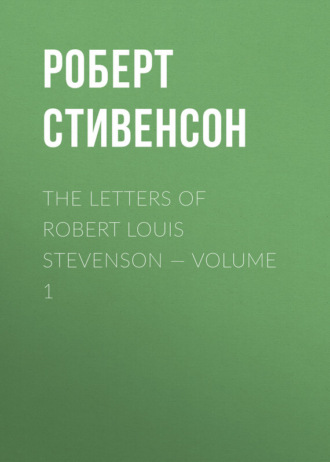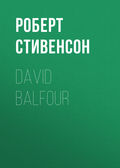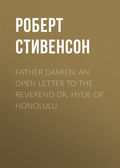
Роберт Льюис Стивенсон
The Letters of Robert Louis Stevenson — Volume 1
I am now a person with an established ill-health — a wife — a dog possessed with an evil, a Gadarene spirit — a chalet on a hill, looking out over the Mediterranean — a certain reputation — and very obscure finances. Otherwise, very much the same, I guess; and were a bottle of Fleury a thing to be obtained, capable of developing theories along with a fit spirit even as of yore. Yet I now draw near to the Middle Ages; nearly three years ago, that fatal Thirty struck; and yet the great work is not yet done — not yet even conceived. But so, as one goes on, the wood seems to thicken, the footpath to narrow, and the House Beautiful on the hill's summit to draw further and further away. We learn, indeed, to use our means; but only to learn, along with it, the paralysing knowledge that these means are only applicable to two or three poor commonplace motives. Eight years ago, if I could have slung ink as I can now, I should have thought myself well on the road after Shakespeare; and now — I find I have only got a pair of walking- shoes and not yet begun to travel. And art is still away there on the mountain summit. But I need not continue; for, of course, this is your story just as much as it is mine; and, strange to think, it was Shakespeare's too, and Beethoven's, and Phidias's. It is a blessed thing that, in this forest of art, we can pursue our wood- lice and sparrows, AND NOT CATCH THEM, with almost the same fervour of exhilaration as that with which Sophocles hunted and brought down the Mastodon.
Tell me something of your work, and your wife. — My dear fellow, I am yours ever,
R. L. STEVENSON.
My wife begs to be remembered to both of you; I cannot say as much for my dog, who has never seen you, but he would like, on general principles, to bite you.
Letter: TO W. E. HENLEY
[HYERES, NOVEMBER 1883.]
MY DEAR LAD, — .. Of course, my seamanship is jimmy: did I not beseech you I know not how often to find me an ancient mariner — and you, whose own wife's own brother is one of the ancientest, did nothing for me? As for my seamen, did Runciman ever know eighteenth century buccaneers? No? Well, no more did I. But I have known and sailed with seamen too, and lived and eaten with them; and I made my put-up shot in no great ignorance, but as a put-up thing has to be made, I.E. to be coherent and picturesque, and damn the expense. Are they fairly lively on the wires? Then, favour me with your tongues. Are they wooden, and dim, and no sport? Then it is I that am silent, otherwise not. The work, strange as it may sound in the ear, is not a work of realism. The next thing I shall hear is that the etiquette is wrong in Otto's Court! With a warrant, and I mean it to be so, and the whole matter never cost me half a thought. I make these paper people to please myself, and Skelt, and God Almighty, and with no ulterior purpose. Yet am I mortal myself; for, as I remind you, I begged for a supervising mariner. However, my heart is in the right place. I have been to sea, but I never crossed the threshold of a court; and the courts shall be the way I want 'em.
I'm glad to think I owe you the review that pleased me best of all the reviews I ever had; the one I liked best before that was — 's on the ARABIANS. These two are the flowers of the collection, according to me. To live reading such reviews and die eating ortolans — sich is my aspiration.
Whenever you come you will be equally welcome. I am trying to finish OTTO ere you shall arrive, so as to take and be able to enjoy a well-earned — O yes, a well-earned — holiday. Longman fetched by Otto: is it a spoon or a spoilt horn? Momentous, if the latter; if the former, a spoon to dip much praise and pudding, and to give, I do think, much pleasure. The last part, now in hand, much smiles upon me. — Ever yours,
R. L. S.
Letter: TO MRS. THOMAS STEVENSON
LA SOLITUDE, HYERES, [NOVEMBER 1883]
MY DEAR MOTHER, — You must not blame me too much for my silence; I am over head and ears in work, and do not know what to do first. I have been hard at OTTO, hard at SILVERADO proofs, which I have worked over again to a tremendous extent; cutting, adding, rewriting, until some of the worst chapters of the original are now, to my mind, as good as any. I was the more bound to make it good, as I had such liberal terms; it's not for want of trying if I have failed.
I got your letter on my birthday; indeed, that was how I found it out about three in the afternoon, when postie comes. Thank you for all you said. As for my wife, that was the best investment ever made by man; but 'in our branch of the family' we seem to marry well. I, considering my piles of work, am wonderfully well; I have not been so busy for I know not how long. I hope you will send me the money I asked however, as I am not only penniless, but shall remain so in all human probability for some considerable time. I have got in the mass of my expectations; and the 100 pounds which is to float us on the new year can not come due till SILVERADO is all ready; I am delaying it myself for the moment; then will follow the binders and the travellers and an infinity of other nuisances; and only at the last, the jingling-tingling.
Do you know that TREASURE ISLAND has appeared? In the November number of Henley's Magazine, a capital number anyway, there is a funny publisher's puff of it for your book; also a bad article by me. Lang dotes on TREASURE ISLAND: 'Except TOM SAWYER and the ODYSSEY,' he writes, 'I never liked any romance so much.' I will inclose the letter though. The Bogue is angelic, although very dirty. It has rained — at last! It was jolly cold when the rain came.
I was overjoyed to hear such good news of my father. Let him go on at that! Ever your affectionate,
R. L. S.
Letter: TO SIDNEY COLVIN
LA SOLITUDE, HYERES-LES-PALMIERS, VAR, [NOVEMBER 1883]
MY DEAR COLVIN, — I have been bad, but as you were worse, I feel no shame. I raise a blooming countenance, not the evidence of a self- righteous spirit.
I continue my uphill fight with the twin spirits of bankruptcy and indigestion. Duns rage about my portal, at least to fancy's ear.
I suppose you heard of Ferrier's death: my oldest friend, except Bob. It has much upset me. I did not fancy how much. I am strangely concerned about it.
My house is the loveliest spot in the universe; the moonlight nights we have are incredible; love, poetry and music, and the Arabian Nights, inhabit just my corner of the world — nest there like mavises.
Here lies The carcase of Robert Louis Stevenson, An active, austere, and not inelegant writer, who, at the termination of a long career, wealthy, wise, benevolent, and honoured by the attention of two hemispheres, yet owned it to have been his crowning favour TO INHABIT LA SOLITUDE.
(With the consent of the intelligent edility of Hyeres, he has been interred, below this frugal stone, in the garden which he honoured for so long with his poetic presence.)
I must write more solemn letters. Adieu. Write.
R. L. S.
Letter: TO MRS. MILNE
LA SOLITUDE, HYERES, [NOVEMBER 1883]
MY DEAR HENRIETTA, — Certainly; who else would they be? More by token, on that particular occasion, you were sailing under the title of Princess Royal; I, after a furious contest, under that of Prince Alfred; and Willie, still a little sulky, as the Prince of Wales. We were all in a buck basket about half-way between the swing and the gate; and I can still see the Pirate Squadron heave in sight upon the weather bow.
I wrote a piece besides on Giant Bunker; but I was not happily inspired, and it is condemned. Perhaps I'll try again; he was a horrid fellow, Giant Bunker! and some of my happiest hours were passed in pursuit of him. You were a capital fellow to play: how few there were who could! None better than yourself. I shall never forget some of the days at Bridge of Allan; they were one golden dream. See 'A Good Boy' in the PENNY WHISTLES, much of the sentiment of which is taken direct from one evening at B. of A. when we had had a great play with the little Glasgow girl. Hallowed be that fat book of fairy tales! Do you remember acting the Fair One with Golden Locks? What a romantic drama! Generally speaking, whenever I think of play, it is pretty certain that you will come into my head. I wrote a paper called 'Child's Play' once, where, I believe, you or Willie would recognise things..
Surely Willie is just the man to marry; and if his wife wasn't a happy woman, I think I could tell her who was to blame. Is there no word of it? Well, these things are beyond arrangement; and the wind bloweth where it listeth — which, I observe, is generally towards the west in Scotland. Here it prefers a south-easterly course, and is called the Mistral — usually with an adjective in front. But if you will remember my yesterday's toothache and this morning's crick, you will be in a position to choose an adjective for yourself. Not that the wind is unhealthy; only when it comes strong, it is both very high and very cold, which makes it the d-v- l. But as I am writing to a lady, I had better avoid this topic; winds requiring a great scope of language.
Please remember me to all at home; give Ramsay a pennyworth of acidulated drops for his good taste. — And believe me, your affectionate cousin,
ROBERT LOUIS STEVENSON.
Letter: TO MISS FERRIER
LA SOLITUDE, HYERES, VAR, NOVEMBER 22, 1883
DEAR MISS FERRIER, — Many thanks for the photograph. It is — well, it is like most photographs. The sun is an artist of too much renown; and, at any rate, we who knew Walter 'in the brave days of old' will be difficult to please.
I was inexpressibly touched to get a letter from some lawyers as to some money. I have never had any account with my friends; some have gained and some lost; and I should feel there was something dishonest in a partial liquidation even if I could recollect the facts, WHICH I CANNOT. But the fact of his having put aside this memorandum touched me greatly.
The mystery of his life is great. Our chemist in this place, who had been at Malvern, recognised the picture. You may remember Walter had a romantic affection for all pharmacies? and the bottles in the window were for him a poem? He said once that he knew no pleasure like driving through a lamplit city, waiting for the chemists to go by.
All these things return now.
He had a pretty full translation of Schiller's AESTHETIC LETTERS, which we read together, as well as the second part of FAUST, in Gladstone Terrace, he helping me with the German. There is no keepsake I should more value than the MS. of that translation. They were the best days I ever had with him, little dreaming all would so soon be over. It needs a blow like this to convict a man of mortality and its burthen. I always thought I should go by myself; not to survive. But now I feel as if the earth were undermined, and all my friends have lost one thickness of reality since that one passed. Those are happy who can take it otherwise; with that I found things all beginning to dislimn. Here we have no abiding city, and one felt as though he had — and O too much acted.
But if you tell me, he did not feel my silence. However, he must have done so; and my guilt is irreparable now. I thank God at least heartily that he did not resent it.
Please remember me to Sir Alexander and Lady Grant, to whose care I will address this. When next I am in Edinburgh I will take flowers, alas! to the West Kirk. Many a long hour we passed in graveyards, the man who has gone and I — or rather not that man — but the beautiful, genial, witty youth who so betrayed him. — Dear Miss Ferrier, I am yours most sincerely,
ROBERT LOUIS STEVENSON.
Letter: TO W. H. LOW
LA SOLITUDE, HYERES, VAR, 13TH DECEMBER 1883
MY DEAR LOW, — .. I was much pleased with what you send about my work. Ill-health is a great handicapper in the race. I have never at command that press of spirits that are necessary to strike out a thing red-hot. SILVERADO is an example of stuff worried and pawed about, God knows how often, in poor health, and you can see for yourself the result: good pages, an imperfect fusion, a certain languor of the whole. Not, in short, art. I have told Roberts to send you a copy of the book when it appears, where there are some fair passages that will be new to you. My brief romance, PRINCE OTTO — far my most difficult adventure up to now — is near an end. I have still one chapter to write DE FOND EN COMBLE, and three or four to strengthen or recast. The rest is done. I do not know if I have made a spoon, or only spoiled a horn; but I am tempted to hope the first. If the present bargain hold, it will not see the light of day for some thirteen months. Then I shall be glad to know how it strikes you. There is a good deal of stuff in it, both dramatic and, I think, poetic; and the story is not like these purposeless fables of to-day, but is, at least, intended to stand FIRM upon a base of philosophy — or morals — as you please. It has been long gestated, and is wrought with care. ENFIN, NOUS VERRONS. My labours have this year for the first time been rewarded with upwards of 350 pounds; that of itself, so base we are! encourages me; and the better tenor of my health yet more. — Remember me to Mrs. Low, and believe me, yours most sincerely,
ROBERT LOUIS STEVENSON.
Letter: TO THOMAS STEVENSON
LA SOLITUDE, DECEMBER 20, 1883
MY DEAR FATHER, — I do not know which of us is to blame; I suspect it is you this time. The last accounts of you were pretty good, I was pleased to see; I am, on the whole, very well — suffering a little still from my fever and liver complications, but better.
I have just finished re-reading a book, which I counsel you above all things NOT to read, as it has made me very ill, and would make you worse — Lockhart's SCOTT. It is worth reading, as all things are from time to time that keep us nose to nose with fact; though I think such reading may be abused, and that a great deal of life is better spent in reading of a light and yet chivalrous strain. Thus, no Waverley novel approaches in power, blackness, bitterness, and moral elevation to the diary and Lockhart's narrative of the end; and yet the Waverley novels are better reading for every day than the Life. You may take a tonic daily, but not phlebotomy.
The great double danger of taking life too easily, and taking it too hard, how difficult it is to balance that! But we are all too little inclined to faith; we are all, in our serious moments, too much inclined to forget that all are sinners, and fall justly by their faults, and therefore that we have no more to do with that than with the thunder-cloud; only to trust, and do our best, and wear as smiling a face as may be for others and ourselves. But there is no royal road among this complicated business. Hegel the German got the best word of all philosophy with his antinomies: the contrary of everything is its postulate. That is, of course, grossly expressed, but gives a hint of the idea, which contains a great deal of the mysteries of religion, and a vast amount of the practical wisdom of life. For your part, there is no doubt as to your duty — to take things easy and be as happy as you can, for your sake, and my mother's, and that of many besides. Excuse this sermon. — Ever your loving son,
R. L. S.
Letter: TO MR. AND MRS. THOMAS STEVENSON
LA SOLITUDE, DECEMBER 25, 1883
MY DEAR FATHER AND MOTHER, — This it is supposed will reach you about Christmas, and I believe I should include Lloyd in the greeting. But I want to lecture my father; he is not grateful enough; he is like Fanny; his resignation is not the 'true blue.' A man who has gained a stone; whose son is better, and, after so many fears to the contrary, I dare to say, a credit to him; whose business is arranged; whose marriage is a picture — what I should call resignation in such a case as his would be to 'take down his fiddle and play as lood as ever he could.' That and nought else. And now, you dear old pious ingrate, on this Christmas morning, think what your mercies have been; and do not walk too far before your breakfast — as far as to the top of India Street, then to the top of Dundas Street, and then to your ain stair heid; and do not forget that even as LABORARE, so JOCULARI, EST ORARE; and to be happy the first step to being pious.
I have as good as finished my novel, and a hard job it has been — but now practically over, LAUS DEO! My financial prospects better than ever before; my excellent wife a touch dolorous, like Mr. Tommy; my Bogue quite converted, and myself in good spirits. O, send Curry Powder per Baxter.
R. L. S.
Letter: TO MRS. THOMAS STEVENSON
[LA SOLITUDE, HYERES], LAST SUNDAY OF '83
MY DEAR MOTHER, — I give my father up. I give him a parable: that the Waverley novels are better reading for every day than the tragic Life. And he takes it backside foremost, and shakes his head, and is gloomier than ever. Tell him that I give him up. I don't want no such a parent. This is not the man for my money. I do not call that by the name of religion which fills a man with bile. I write him a whole letter, bidding him beware of extremes, and telling him that his gloom is gallows-worthy; and I get back an answer — Perish the thought of it.
Here am I on the threshold of another year, when, according to all human foresight, I should long ago have been resolved into my elements; here am I, who you were persuaded was born to disgrace you — and, I will do you the justice to add, on no such insufficient grounds — no very burning discredit when all is done; here am I married, and the marriage recognised to be a blessing of the first order, A1 at Lloyd's. There is he, at his not first youth, able to take more exercise than I at thirty-three, and gaining a stone's weight, a thing of which I am incapable. There are you; has the man no gratitude? There is Smeoroch: is he blind? Tell him from me that all this is
NOT THE TRUE BLUE!
I will think more of his prayers when I see in him a spirit of PRAISE. Piety is a more childlike and happy attitude than he admits. Martha, Martha, do you hear the knocking at the door? But Mary was happy. Even the Shorter Catechism, not the merriest epitome of religion, and a work exactly as pious although not quite so true as the multiplication table — even that dry-as-dust epitome begins with a heroic note. What is man's chief end? Let him study that; and ask himself if to refuse to enjoy God's kindest gifts is in the spirit indicated. Up, Dullard! It is better service to enjoy a novel than to mump.
I have been most unjust to the Shorter Catechism, I perceive. I wish to say that I keenly admire its merits as a performance; and that all that was in my mind was its peculiarly unreligious and unmoral texture; from which defect it can never, of course, exercise the least influence on the minds of children. But they learn fine style and some austere thinking unconsciously. — Ever your loving son,
R. L. S.
Letter: TO MR. AND MRS. THOMAS STEVENSON
LA SOLITUDE, HYERES-LES-PALMIERS, VAR, JANUARY 1 (1884)
MY DEAR PEOPLE, — A Good New Year to you. The year closes, leaving me with 50 pounds in the bank, owing no man nothing, 100 pounds more due to me in a week or so, and 150 pounds more in the course of the month; and I can look back on a total receipt of 465 pounds, 0s. 6d. for the last twelve months!
And yet I am not happy!
Yet I beg! Here is my beggary: -
1. Sellar's Trial. 2. George Borrow's Book about Wales. 3. My Grandfather's Trip to Holland. 4. And (but this is, I fear, impossible) the Bell Rock Book.
When I think of how last year began, after four months of sickness and idleness, all my plans gone to water, myself starting alone, a kind of spectre, for Nice — should I not be grateful? Come, let us sing unto the Lord!
Nor should I forget the expected visit, but I will not believe in that till it befall; I am no cultivator of disappointments, 'tis a herb that does not grow in my garden; but I get some good crops both of remorse and gratitude. The last I can recommend to all gardeners; it grows best in shiny weather, but once well grown, is very hardy; it does not require much labour; only that the husbandman should smoke his pipe about the flower-plots and admire God's pleasant wonders. Winter green (otherwise known as Resignation, or the 'false gratitude plant') springs in much the same soil; is little hardier, if at all; and requires to be so dug about and dunged, that there is little margin left for profit. The variety known as the Black Winter green (H. V. Stevensoniana) is rather for ornament than profit.
'John, do you see that bed of resignation?' — 'It's doin' bravely, sir.' — 'John, I will not have it in my garden; it flatters not the eye and comforts not the stomach; root it out.' — 'Sir, I ha'e seen o' them that rase as high as nettles; gran' plants!' — 'What then? Were they as tall as alps, if still unsavoury and bleak, what matters it? Out with it, then; and in its place put Laughter and a Good Conceit (that capital home evergreen), and a bush of Flowering Piety — but see it be the flowering sort — the other species is no ornament to any gentleman's Back Garden.'
JNO. BUNYAN.
Letter: TO SIDNEY COLVIN
LA SOLITUDE, HYERES-LES-PALMIERS, VAR, 9TH MARCH 1884
MY DEAR S. C., — You will already have received a not very sane note from me; so your patience was rewarded — may I say, your patient silence? However, now comes a letter, which on receipt, I thus acknowledge.
I have already expressed myself as to the political aspect. About Grahame, I feel happier; it does seem to have been really a good, neat, honest piece of work. We do not seem to be so badly off for commanders: Wolseley and Roberts, and this pile of Woods, Stewarts, Alisons, Grahames, and the like. Had we but ONE statesman on any side of the house!
Two chapters of OTTO do remain: one to rewrite, one to create; and I am not yet able to tackle them. For me it is my chief o' works; hence probably not so for others, since it only means that I have here attacked the greatest difficulties. But some chapters towards the end: three in particular — I do think come off. I find them stirring, dramatic, and not unpoetical. We shall see, however; as like as not, the effort will be more obvious than the success. For, of course, I strung myself hard to carry it out. The next will come easier, and possibly be more popular. I believe in the covering of much paper, each time with a definite and not too difficult artistic purpose; and then, from time to time, drawing oneself up and trying, in a superior effort, to combine the facilities thus acquired or improved. Thus one progresses. But, mind, it is very likely that the big effort, instead of being the masterpiece, may be the blotted copy, the gymnastic exercise. This no man can tell; only the brutal and licentious public, snouting in Mudie's wash-trough, can return a dubious answer.
I am to-day, thanks to a pure heaven and a beneficent, loud- talking, antiseptic mistral, on the high places as to health and spirits. Money holds out wonderfully. Fanny has gone for a drive to certain meadows which are now one sheet of jonquils: sea-bound meadows, the thought of which may freshen you in Bloomsbury. 'Ye have been fresh and fair, Ye have been filled with flowers' — I fear I misquote. Why do people babble? Surely Herrick, in his true vein, is superior to Martial himself, though Martial is a very pretty poet.
Did you ever read St. Augustine? The first chapters of the CONFESSIONS are marked by a commanding genius. Shakespearian in depth. I was struck dumb, but, alas! when you begin to wander into controversy, the poet drops out. His description of infancy is most seizing. And how is this: 'Sed majorum nugae negotia vocantur; puerorum autem talia cum sint puniuntur a majoribus.' Which is quite after the heart of R. L. S. See also his splendid passage about the 'luminosus limes amicitiae' and the 'nebulae de limosa concupiscentia carnis'; going on 'UTRUMQUE in confuso aestuabat et rapiebat imbecillam aetatem per abrupta cupiditatum.' That 'Utrumque' is a real contribution to life's science. Lust ALONE is but a pigmy; but it never, or rarely, attacks us single- handed.
Do you ever read (to go miles off, indeed) the incredible Barbey d'Aurevilly? A psychological Poe — to be for a moment Henley. I own with pleasure I prefer him with all his folly, rot, sentiment, and mixed metaphors, to the whole modern school in France. It makes me laugh when it's nonsense; and when he gets an effect (though it's still nonsense and mere Poery, not poesy) it wakens me. CE QUI NE MEURT PAS nearly killed me with laughing, and left me — well, it left me very nearly admiring the old ass. At least, it's the kind of thing one feels one couldn't do. The dreadful moonlight, when they all three sit silent in the room — by George, sir, it's imagined — and the brief scene between the husband and wife is all there. QUANT AU FOND, the whole thing, of course, is a fever dream, and worthy of eternal laughter. Had the young man broken stones, and the two women been hard-working honest prostitutes, there had been an end of the whole immoral and baseless business: you could at least have respected them in that case.
I also read PETRONIUS ARBITER, which is a rum work, not so immoral as most modern works, but singularly silly. I tackled some Tacitus too. I got them with a dreadful French crib on the same page with the text, which helps me along and drives me mad. The French do not even try to translate. They try to be much more classical than the classics, with astounding results of barrenness and tedium. Tacitus, I fear, was too solid for me. I liked the war part; but the dreary intriguing at Rome was too much.
R. L. S.
Letter: TO MR. DICK
LA SOLITUDE, HYERES, VAR, 12TH MARCH 1884
MY DEAR MR. DICK, — I have been a great while owing you a letter; but I am not without excuses, as you have heard. I overworked to get a piece of work finished before I had my holiday, thinking to enjoy it more; and instead of that, the machinery near hand came sundry in my hands! like Murdie's uniform. However, I am now, I think, in a fair way of recovery; I think I was made, what there is of me, of whipcord and thorn-switches; surely I am tough! But I fancy I shall not overdrive again, or not so long. It is my theory that work is highly beneficial, but that it should, if possible, and certainly for such partially broken-down instruments as the thing I call my body, be taken in batches, with a clear break and breathing space between. I always do vary my work, laying one thing aside to take up another, not merely because I believe it rests the brain, but because I have found it most beneficial to the result. Reading, Bacon says, makes a full man, but what makes me full on any subject is to banish it for a time from all my thoughts. However, what I now propose is, out of every quarter, to work two months' and rest the third. I believe I shall get more done, as I generally manage, on my present scheme, to have four months' impotent illness and two of imperfect health — one before, one after, I break down. This, at least, is not an economical division of the year.
I re-read the other day that heartbreaking book, the LIFE OF SCOTT. One should read such works now and then, but O, not often. As I live, I feel more and more that literature should be cheerful and brave-spirited, even if it cannot be made beautiful and pious and heroic. We wish it to be a green place; the WAVERLEY NOVELS are better to re-read than the over-true life, fine as dear Sir Walter was. The Bible, in most parts, is a cheerful book; it is our little piping theologies, tracts, and sermons that are dull and dowie; and even the Shorter Catechism, which is scarcely a work of consolation, opens with the best and shortest and completest sermon ever written — upon Man's chief end. — Believe me, my dear Mr. Dick, very sincerely yours,
ROBERT LOUIS STEVENSON.
P.S. — You see I have changed my hand. I was threatened apparently with scrivener's cramp, and at any rate had got to write so small, that the revisal of my MS. tried my eyes, hence my signature alone remains upon the old model; for it appears that if I changed that, I should be cut off from my 'vivers.'
R. L. S.
Letter: TO COSMO MONKHOUSE
LA SOLITUDE, HYERES-LES-PALMIERS, VAR, MARCH 16, 1884
MY DEAR MONKHOUSE, — You see with what promptitude I plunge into correspondence; but the truth is, I am condemned to a complete inaction, stagnate dismally, and love a letter. Yours, which would have been welcome at any time, was thus doubly precious.
Dover sounds somewhat shiveringly in my ears. You should see the weather I have — cloudless, clear as crystal, with just a punkah- draft of the most aromatic air, all pine and gum tree. You would be ashamed of Dover; you would scruple to refer, sir, to a spot so paltry. To be idle at Dover is a strange pretension; pray, how do you warm yourself? If I were there I should grind knives or write blank verse, or — But at least you do not bathe? It is idle to deny it: I have — I may say I nourish — a growing jealousy of the robust, large-legged, healthy Britain-dwellers, patient of grog, scorners of the timid umbrella, innocuously breathing fog: all which I once was, and I am ashamed to say liked it. How ignorant is youth! grossly rolling among unselected pleasures; and how nobler, purer, sweeter, and lighter, to sip the choice tonic, to recline in the luxurious invalid chair, and to tread, well-shawled, the little round of the constitutional. Seriously, do you like to repose? Ye gods, I hate it. I never rest with any acceptation; I do not know what people mean who say they like sleep and that damned bedtime which, since long ere I was breeched, has rung a knell to all my day's doings and beings. And when a man, seemingly sane, tells me he has 'fallen in love with stagnation,' I can only say to him, 'You will never be a Pirate!' This may not cause any regret to Mrs. Monkhouse; but in your own soul it will clang hollow — think of it! Never! After all boyhood's aspirations and youth's immoral day-dreams, you are condemned to sit down, grossly draw in your chair to the fat board, and be a beastly Burgess till you die. Can it be? Is there not some escape, some furlough from the Moral Law, some holiday jaunt contrivable into a Better Land? Shall we never shed blood? This prospect is too grey.







